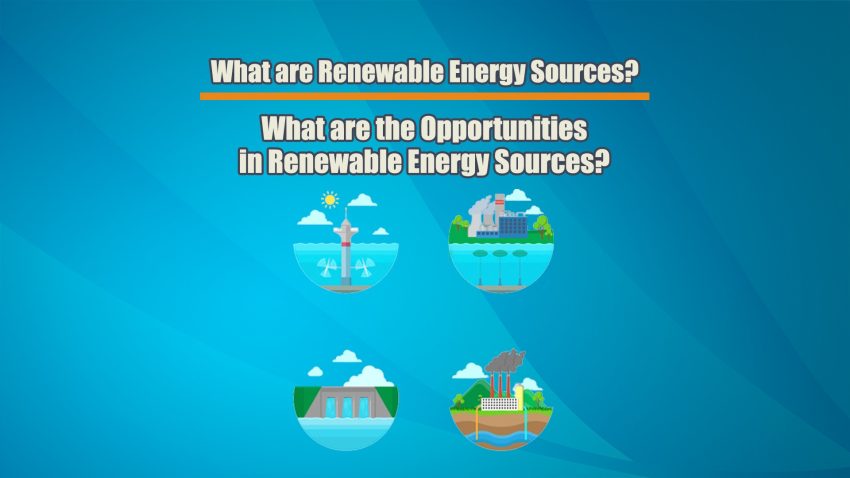İçindekiler
What are Renewable Energy Sources?
Renewable energy sources are energy sources that do not consume the resources of nature and can be repeated unlimitedly. Among these resources:
- Solar Energy: Solar energy is a technology in which the sun’s rays are converted into electrical energy. Solar panels convert solar energy into electrical energy and this energy can be used in homes and businesses.
- Wind Energy: Wind energy is a technology in which the kinetic energy of the wind is converted into electrical energy. Wind turbines cause the rotational motion of the wind, which is converted into electrical energy by generators.
- Hydraulic Energy: Hydraulic energy is a technology in which the kinetic energy of water is converted into electrical energy. Hydroelectric power plants generate electrical energy by running generators with the rotational movement of water.
- Biomass Energy: Biomass energy is the energy obtained through the combustion or fermentation of organic wastes. Biomass energy can be used in many different ways, such as biomass plants, biogas plants, and heating systems using biomass fuel.
- Geothermal Energy: Geothermal energy is the energy obtained by using hot water and steam underground. Geothermal energy sources can be used through geothermal power plants installed in places with steam output.
These renewable energy sources can help us move towards a clean and sustainable energy future by replacing fossil fuels.
What are Renewable Energy Resources in Turkey?
Renewable energy sources used in Turkey are as follows:
- Wind Energy: The wind energy potential in Turkey is quite high. Especially in the Aegean and Marmara regions, wind turbines are used intensively. Wind energy has an important place in Turkey’s total energy production.
- Hydroelectric Energy: The kinetic energy of water is converted into electrical energy by using hydroelectric power plants, dams and turbines in Turkey. Especially in Eastern Anatolia and Southeastern Anatolia regions, hydroelectric power plants are concentrated.
- Solar Energy: The solar energy potential in Turkey is quite high. Solar energy is converted into electrical energy through solar panels. Solar energy is used especially in Southeastern Anatolia and Mediterranean regions.
- Biomass Energy: In Turkey, biomass energy is obtained by incineration or fermentation of organic wastes. Biomass energy is used in agriculture and livestock sectors.
- Geothermal Energy: In Turkey, geothermal energy is widely used, especially in the Aegean and Marmara regions. Hot water and steam underground are converted into electrical energy through geothermal power plants.
- Tidal Energy: There is tidal energy potential in some parts of Turkey, especially in the Black Sea. Tidal energy generates electrical energy by using potential energy from differences in sea level.
- Biogas: Biogas is a gas produced through the fermentation of organic wastes. In Turkey, it is possible to use domestic wastes as well as wastes from the livestock sector for biogas production.
- Lithium-Ion Batteries: Lithium-ion batteries are used for the storage of renewable energy sources. Turkey has lithium-ion battery technology and produces in this field.
These renewable energy sources meet some of Turkey’s energy needs and contribute to clean energy production.
What are the Opportunities in Renewable Energy Sources?
- Bioethanol: Bioethanol is a biofuel produced through the fermentation of organic waste. In Turkey, the use of wastes produced in the agricultural sector for bioethanol production is seen as a potential resource.
- Biodiesel: Biodiesel is a biofuel produced by transesterification of vegetable oils. In Turkey, it is possible to use especially sunflower oil and other vegetable oils for biodiesel production.
- Ocean Thermal Energy: Turkey is one of the rare countries with ocean thermal energy potential. Ocean thermal energy generates electrical energy by using potential energy from different temperatures of sea water.
- Fuel Cell: Fuel cells are devices that produce electrical energy as a result of combining hydrogen with oxygen. Turkey is a developing country in hydrogen production and fuel cell technology.
- Sea Wave Energy: Turkey’s long coastline is seen as a potential source for converting the motion energy of sea waves into electrical energy. However, this energy source is not used commercially in Turkey yet.
These renewable energy sources can be an alternative way to meet Turkey’s energy needs. However, some of them are still under development or not used in Turkey.







